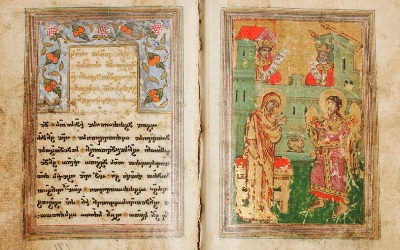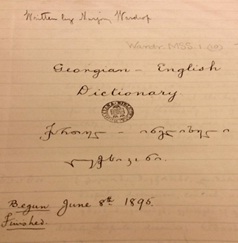

|
The Kartvelologist The Kartvelologist” is a bilingual (Georgian and English) peer-reviewed, academic journal, covering all spheres of Kartvelological scholarship. Along with introducing scholarly novelties in Georgian Studies, it aims at popularization of essays of Georgian researchers on the international level and diffusion of foreign Kartvelological scholarship in Georgian scholarly circles. “The Kartvelologist” issues both in printed and electronic form. In 1993-2009 it came out only in printed form (#1-15). The publisher is the “Centre for Kartvelian Studies” (TSU), financially supported by the “Fund of the Kartvelological School”. In 2011-2013 the journal is financed by Shota Rustaveli National Science Foundation. |
The Borrowed Plant Name Stems in the Georgian Gospel
keywords:Borrowed Vocabulary; Plant Names; Georgian Gospel Category: SCHOLARLY STUDIES Authors: Tinatin Margalitadze, Marika Odzeli A Neglected Pioneer: Carla Serena (1820-1884) (Travels in Imereti, Mingrelia, Samurzakano, Abkhazia, Kakheti, Guria, and the districts of Gori, Borjomi, and Akhaltsikhe, 1876-77 and 1881)
A famous woman traveler, Carla Serena, traveled in our country twice. This active woman, who so bravely traveled through our region and barren places of Persia, has prepared a book extensively describing her travel in the Caucasus with photos, which will be published in Paris. This is what one French newspaper wrote about Carla Serena: “A tireless woman traveler, Carla Serena, has recently arrived into Paris from the Caucasus and brought with her numerous photos of the nature and people of the Caucasus; these photos will be included in her literary work Caucasus which she has already started to publish.” This woman was received with great honor in Europe: the King of Italy had a large gold medal cast for her. The London Geographic Society asked her to deliver a public lecture about her travels. Her two interesting literary works – From the Baltic Sea to the Caspian Sea and A European Woman in Persia – were translated into Italian. Madame Carla Serena and her travels certainly deserve more than this brief mention. She remains an elusive figure. There may be more extensive presentations of her in Georgian publications, but these do not appear to have been referenced in any English-language work. In fact, the few English-language references to her are minimal, incomplete and usually inaccurate. Carla Serena’s travels in Georgia published in French between1880 and 1884in a series of very interesting, detailed and well-illustrated articles, have not, to the best of my knowledge, been translated into English (or Georgian) or republished in French. However, Droeba’s brief mention of Carla Serena, lacking virtually all needed detail, at least provides a starting point for discussing (as this article will): (1) Who was Carla Serena? (2) When and where did she travel in Georgia? (3) Carla Serena’s travel narratives, (4) The importance of her account, (5) Unexplored aspects of Carla Serena’s travels in Georgia, (6) the strange case of Bertha von Suttner, and (7) Carla Serena’s known and unknown predecessors.
keywords:Georgia, Calra Serena, Suttners, Vivian Ingham, Anne Lister, Odett Keun Category: SCHOLARLY STUDIES Authors: Tinatin Margalitadze, Marika Odzeli Lexicographic Activities of Marjory Wardrop
*** In Georgia, Marjory Wardrop is primarily known as a translator of The Knight in the Panther’s Skin into English and a great friend of our country. She had very strong ties with the 19th century Georgian public figures and representatives of the Georgian intellectual elite. In the 20th century her name became widely known and she was familiar, with great affection, to everybody in Georgia. Now, in the 21st century, Georgians should not consign to oblivion the works and achievements of this brilliant English lady. We believe it would be highly appropriate to once again remind our public about the great services she rendered to the promotion of Georgian culture. In the present article we shall focus on a comparatively less well-known aspect of her activities – lexicography. keywords:Marjory Wardrop, Lexicography, Oxford, The Wardrop Fund Category: SCHOLARLY STUDIES Authors: Tinatin Margalitadze, Marika Odzeli Examining the Effectiveness of Monolingual, Bilingual and Bilingualised Dictionaries for Georgian Learners
In the 1970s, the scientific study of dictionary users and dictionary usage came into the limelight of lexicographers. The same period is remarkable for the investigation of vocabulary users, revealing the marked tendency of contemporary theoretical lexicography. Thus, in foreign countries, all the working processes related to the word-entries are based on such an empirical research taking into consideration users’ requirements. A lot of studies have been conducted in order to examine dictionary users and dictionary usage in various countries. However, our study of Georgian dictionary users is one of the first attempts of this kind.
keywords:monolingual dictionary, bilingual dictionary, bilingualized dictionary. Category: SCHOLARLY STUDIES Authors: Tinatin Margalitadze, Marika Odzeli
Anthology of Georgian Poetry in French
Kathrine Vivian, an English Kartvelologist, translator of The Man in the Panther Skin and a long term friend of the journal Kartvelologist, published the following article in 1982 in the Revue des Etudes Georgiennes et auasiennes (N 1). I found the manuscript of the Georgian translation of the article (made by Rusudan Tsuladze), and edited by the late scholar Akaki Khintibidze, in the files of materials now being prepared to be sent to the Archive. Obviously, the translation was not published at that time. Akaki Khintibidze, a famous researcher of Georgian versification systems, was ultimately interested in this article due to Kathrine Vivian's remarks regarding the peculiarities of Georgian versification and its relationships with the French and English versification systems. As well as these valuable remarks this article is extremely important regarding the references by Kathrine Vivian to hidden depths and nuances typical of Georgian poetry as well as those regarding the delimitation of the deep originality of verses by Akaki Tsereteli, Vaja Pshavela, Galaktion Tabidze, Giorgi Leonidze, Irakli Abashidze and Valirian Gaprindashvili. I believe it is highly advisable to attract the attention of both Georgian and English speaking researchers to these remarks, valuable for the theory of literary studies, made by an English intellectual, translator and Kartveleologist. Editor keywords:Georgian rhyme, Akaki Khintibidze, Sergi Tsuladze, Connaissance de Roustaveli Category: KARTVELOLOGISTS Authors: Tinatin Margalitadze, Marika Odzeli |
Categories Journal Archive |



 Cultural historians and archeologists assume as undeniable fact the relationship between the Caucasus and the Middle East already in VI-V centuries BC, especially between the countries of the South Caucasus and the Middle East. As is known with confidence, the Caucasus had been a carrier and propagator, Kulturträger, of the ancient civilization’s achievements in the whole Caucasus. Against this background, it is natural to expect the existence of the traces of the ancient areal contacts in the Kartvelian languages. The phonetic and semantic modifications of the borrowed foreign lexical units are interesting and need to be taken into account for the study of the source language as well as of the borrowing language systems, for clarification of certain scientific facts. In this regard, the Georgian Gospel represents an extremely important source of information. According to the purpose of our research a few basic questions arise: how are the plant names transferred to Georgian Gospel texts – via borrowing, translation, transliteration, loan-words, or replacing by the equivalents of the similar semantics? Are there any Proto-Kartvelian roots among the plant names recorded in Gospels? Are there any examples when with the borrowed vocabulary, we also come across with the Georgian (Kartvelian) synonym forms? Did the borrowed material appear in the Georgian language system by way of Gospel texts translation, or did it exist before? Which cultural, religious motives are related to each plant name in the given context? How are the Kartvelian and borrowed roots distributed (for example, depending on whether the plant grows in Georgia or not)? How adequate are the lexical equivalents and how are the errors explained? - We shall try to answer these questions this time using the examples of the borrowed vocabulary.
Cultural historians and archeologists assume as undeniable fact the relationship between the Caucasus and the Middle East already in VI-V centuries BC, especially between the countries of the South Caucasus and the Middle East. As is known with confidence, the Caucasus had been a carrier and propagator, Kulturträger, of the ancient civilization’s achievements in the whole Caucasus. Against this background, it is natural to expect the existence of the traces of the ancient areal contacts in the Kartvelian languages. The phonetic and semantic modifications of the borrowed foreign lexical units are interesting and need to be taken into account for the study of the source language as well as of the borrowing language systems, for clarification of certain scientific facts. In this regard, the Georgian Gospel represents an extremely important source of information. According to the purpose of our research a few basic questions arise: how are the plant names transferred to Georgian Gospel texts – via borrowing, translation, transliteration, loan-words, or replacing by the equivalents of the similar semantics? Are there any Proto-Kartvelian roots among the plant names recorded in Gospels? Are there any examples when with the borrowed vocabulary, we also come across with the Georgian (Kartvelian) synonym forms? Did the borrowed material appear in the Georgian language system by way of Gospel texts translation, or did it exist before? Which cultural, religious motives are related to each plant name in the given context? How are the Kartvelian and borrowed roots distributed (for example, depending on whether the plant grows in Georgia or not)? How adequate are the lexical equivalents and how are the errors explained? - We shall try to answer these questions this time using the examples of the borrowed vocabulary. The newspaper Droeba (No. 63, 25 March 1882) carried an article stating that:
The newspaper Droeba (No. 63, 25 March 1882) carried an article stating that: The Wardrop Fund of the Bodleian Library at Oxford University contains materials related to English-Georgian and Georgian- English dictionaries by Marjory Wardrop. While on an official, scientific mission to the UK in 2014, we made photocopies of the said lexicographic materials, digitalized them and began to study. The present article offers the results of our study.
The Wardrop Fund of the Bodleian Library at Oxford University contains materials related to English-Georgian and Georgian- English dictionaries by Marjory Wardrop. While on an official, scientific mission to the UK in 2014, we made photocopies of the said lexicographic materials, digitalized them and began to study. The present article offers the results of our study.